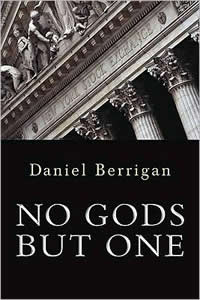Book Notes
 Daniel Berrigan, No Gods But One (Grand Rapids: Eerdmans, 2009), 184pp.
Daniel Berrigan, No Gods But One (Grand Rapids: Eerdmans, 2009), 184pp.
In her memoir Things Seen and Unseen, Nora Gallagher recalls meeting Daniel Berrigan (b. 1921) in the spring of 1986. When she asked how many times he had been jailed, he responded, "Not enough." Poet, playwright, peace activist, and Jesuit priest, Daniel Berrigan has spent a long life obeying the good news of Jesus rather than the bad news of caesar. He and his brother Philip did time on the FBI's Ten Most Wanted list. In 1968, he and eight other activists stole 378 draft files of young men who were about to be sent packing to Vietnam, dumped them into two garbage cans, poured homemade napalm on them, and burned them in the parking lot of the Catonsville, Maryland, draft board. In 1980, he trespassed into General Electric's nuclear missile plant in King of Prussia, Pennsylvania, poured blood on some warhead nose cones, then hammered away to punctuate his prophetic point.
Age has not extinguished Berrigan's fire. Death row, smart bombs, Iraq, corporate sleaze and greed, ruinous politics, empty religion, the American judiciary, and what he calls "abortion mills" still provoke his prophetic pen. Berrigan's latest book is a chapter-and-verse study of Deuteronomy. Throughout the book he struggles to reconcile the God of the oppressed, widows, and aliens with the official, royal deity who slaughters his enemies. These deeply conflicting views of "the god" portray a deity of "double intent." Berrigan is quick to observe that however bloody the Old Testament, we are no better two thousand years later. "Who can claim that (s)he habitually says, 'God and no other? God and no other god?'"
The text of Deuteronomy is "anciently modern." It "transcends itself" from its archaic time and place to call us to faith, and even to create faith in us. The later prophets Isaiah, Jeremiah, Amos and Ezekiel all revise and refine the earlier revelation. "Nor is the fall the final judgment, as though we were bereft of all hope. No, there has occurred an intervention of God, for healing and reconciliation. An intervention named Jesus." Berrigan proceeds chapter by chapter. Every so often he drops in a quote from the New York Times, some poetry or favorite author, a snippet from The Village Voice, or a letter from Catholic bishops. In the end, he calls us to "behave as though the truth were true."


